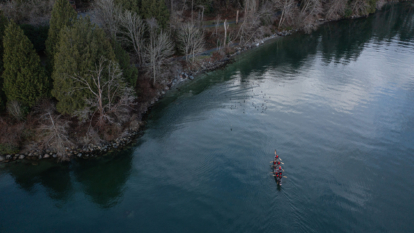We Are the Inlet
Photos by Danielle Khan Da Silva
My heartbeat matches the rhythm of the 10 paddles dipping into the blue-green waters of what is now known as the Burrard Inlet in British Columbia. From the bow, the powerful strokes of Tsleil-Waututh matriarchs set the pace for the rest of us, as they have for millennia. A joyful, expectant energy resonates within the gunnels of the traditional canoe; at moments, we move as one interconnected being. Following months of deadly heat and floods, lockdowns and illness, this day is a gift, a sentiment not lost on any of us. The happiness penetrates deeper as the women at the front of the canoe begin to sing. The day is so dazzling, I almost forget why I’m here: I’ve come to learn about the fight to stop a mortal threat to this community and all the inhabitants of this inlet.
The following afternoon, I’m a guest in the home of Charlene Aleck, or Auntie Char, as she is known. Charlene lives on the Tsleil-Waututh reservation along the north shores of Vancouver. You can see the waters where we paddled from her kitchen window. At her dining table sit her daughter Sara and her niece Kayah (both 23) and Kayah’s mother, Deb, and little brother, Wetuah. “This is what matriarchy feels like,” is the thought in my mind as I listen.
“An Elder told me once, ‘If you ever have problems, you go to the underwater people,’” Charlene says. “So I asked him, ‘Under?’ He goes, ‘Yeah, they’re at the headwaters of the underwater. All underneath us. There’s a whole system underneath.’”
Knowing smiles are exchanged across the table, and soon Kayah and Sara begin to reminisce about canoe trips they took as children up into the headwaters, a part of their territories marked on settler maps as “Indian Arm.” Tsleil-Waututh means “people of the inlet,” and the Tsleil-Waututh creation story teaches that the people of the inlet come from the sediment at the bottom of the inlet—the whole system underneath. “In the Tsleil-Waututh worldview,” Charlene adds, “the inlet is our grandmother, our oldest relative.”
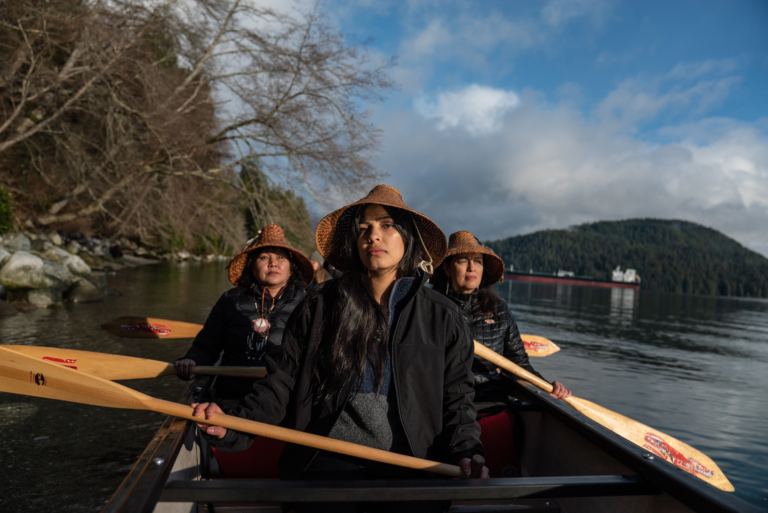
From left to right, Charlene Aleck, Kayah George and Deborah Parker take their rightful place at the bow of a canoe. They each wear a traditional, handwoven cedar-bark hat, a mark of pride in their cultural identity as well as their reputation as formidable paddlers.
Following in the steps of her aunt, Ta7ah, Charlene has been fighting for more than 20 years to defend their oldest relative and all the people, Chinook salmon and orcas who depend on her. On the inlet’s opposite shore there’s a massive refinery, which is fed crude oil from Northern Alberta via the 1,150-kilometer (around 710 miles) Trans Mountain Pipeline. With 84 reported spills to date, the Trans Mountain has been a menace to the Tsleil-Waututh and neighboring coastal communities since it was built in 1953. Now, the Canadian government is leading a multibillion-dollar expansion of the pipeline, which it bought from the Texas-based energy giant Kinder Morgan in 2018 for $4.5 billion.
While the implications of the Trans Mountain expansion could be dire for coastal residents, some conservation groups argue it will be a death sentence for the Southern Resident orcas. According to one report from the Raincoast Conservation Foundation, the noise from increased tanker traffic alone will drive the extinction of these pods. And if this population vanishes, it could be the first time in history that humans will have extinguished an animal population where every individual is known by name. Charlene and her organization, Sacred Trust Initiative, are joined by dozens of ENGOs, citizens coalitions and other Coastal Nations in opposing the pipeline expansion and, ultimately, hoping to shut it down. “This isn’t the first battle, and it won’t be the last,” Charlene vows.
What Coastal First Nations have always known, but Western science is only now coming to understand, is that there are three distinct types of orca whales: transient, offshore and resident. For what are known as Southern Resident orcas—the smallest “resident” orca population in the world—the waters off the coast of British Columbia, Washington and Oregon are their home. It is here that grandmother and mother orcas have passed down the specialized knowledge of how to travel, mate and communicate for millennia.
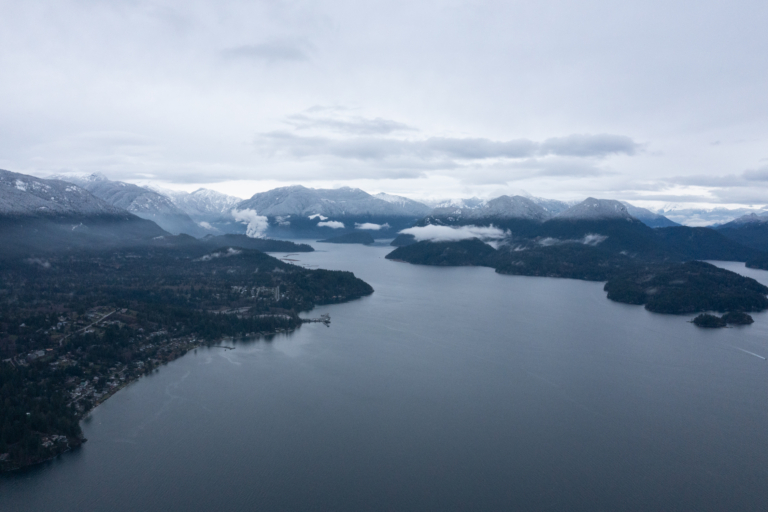
Today’s Burrard Inlet, seen from above.
Resident orcas are matriarchal—they exist in family groups governed by older female orcas. Each pod sings in a distinct dialect and returns to the same hunting areas generation after generation. Their navigation skills are legendary. All along the west coast of British Columbia, First Nations share accounts of orcas helping lost fishermen find their way home. More than a few salty fishermen have shared with me that if you are in trouble, the sight of an orca dorsal fin gliding toward you feels like a sigh of relief.
Many of the most famous orcas—Moby Doll and Namu—lived here, in the waterways we can see from Charlene’s. It was here that white men first captured these whales, stealing and trafficking them to marine aquariums around the world. At Charlene’s kitchen table, I learn Tsleil-Waututh history tells that when their people first came into existence, it was resident orcas who saved them from starvation.
“We call them brothers, sisters, our cousins … they’re our family,” Deb explains. “We learned from the orcas; they showed us how to be on Earth because they were here long before humans. The spirit of the orca comes in, and it’s a protection. It’s a reminder of family, and so we pay respect. The teaching of the orca is that, although the whale travels a distance, it always comes home. It’s a reminder to us to always come home and to care for your pod, to care for your children.”
The poaching of resident orcas occurred during the same era as the theft of First Nations children. From 1867 to 1996, over 150,000 Indigenous children were stolen from their families by the Royal Canadian Mounted Police and brought to residential schools run by various Christian churches; many never returned. Indeed, as we talk at Charlene’s, the grief is still fresh from the May 2021 discovery of up to 6,000 unmarked graves on the grounds of these schools, an exquisitely painful but necessary revelation of blood on the hands of this country. This latest reckoning with genocide continued with the identification of the bodies of 215 children at the Kamloops Indian Residential School, just hours from the Tsleil-Waututh reserve.
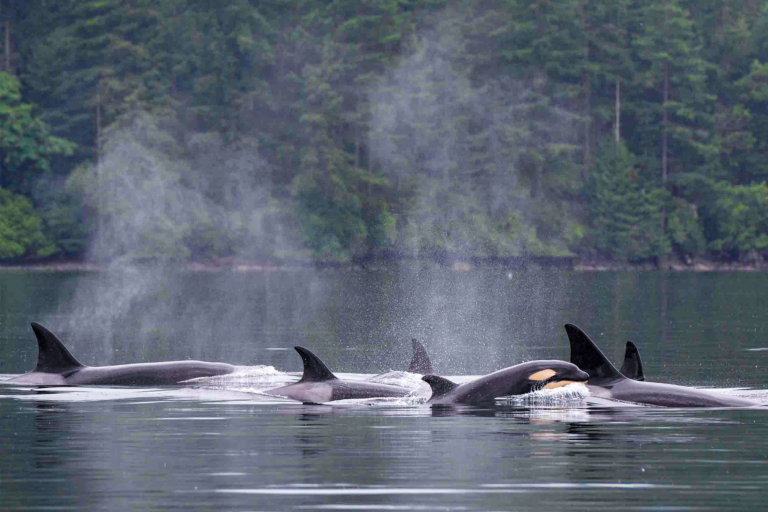
A grandmother leads her family through the Canadian Gulf Islands. You can tell the youngest by the slight “blush” of peach. Photo: Gary Sutton
“I really see the synergy of our lives with the orca,” Charlene says, “as Indigenous [people], Tsleil-Waututh and Tulalip, because it was the Southern Residents and J-Pod [orcas] that were captured and put into aquariums around the world. So having their young ones be taken away, having their songs be interrupted, having their livelihood be at stake, that’s our life history. That’s our story as well.”
A common slogan in Indigenous land protection and sovereignty movements is “First they stole the children from the land. Now they steal the land from the children.” It is a profound understatement to say that the battle to protect orcas is just about environmental protection. For many Tsleil-Waututh, there is no way to separate the well-being of the land from the well-being of the people, or the survival of the resident orcas from the future of the people. The inlet is their grandmother, and her people cannot exist without her.
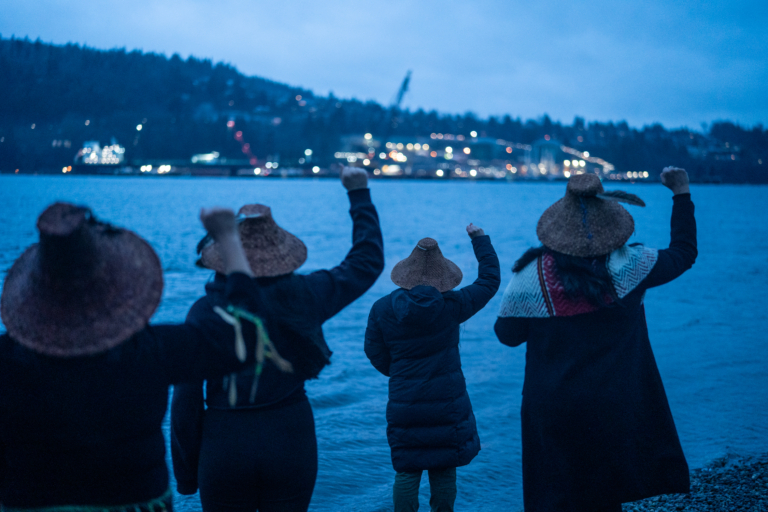
A once-beautiful shoreline has been transformed into a polluting machine on the Tsleil-Waututh reserve in North Vancouver. “Respect our existence or expect our resistance” is the daily mantra of those residing there.
Particularly in the last few years, for many residents British Columbia has become ground zero for the climate crisis—all the more reason to oppose a pipeline. “It started with the heat dome, which killed more than 600 people. And then forest fires that burned into the ground, followed by flooding that destroyed so much farmland and killed thousands of animals. And then severe cold … it’s never-ending. It’s climate disaster after climate disaster,” says Dr. Melissa Lem, president-elect of the Canadian Association of Physicians for the Environment. To Dr. Lem, nothing about this government-funded pipeline makes sense for public health: “The original pipeline had to be shut down for 21 days because of the damage that happened to it from the landslide and the flooding. It was very close to rupturing, and right now, they have abandoned their first attempt to drill the new expansion pipeline under the Fraser River because a sinkhole opened up and they had equipment failure.” It’s a lose-lose scenario, she says. “We’re expanding fossil-fuel infrastructure at a time when BC is being damaged and ravaged by the effects of climate change. It just seems incredibly shortsighted, and it shouldn’t be happening. Putting this infrastructure into place is threatening our land and our water. It’s going to worsen climate change impacts by tripling outputs from the tar sands.”
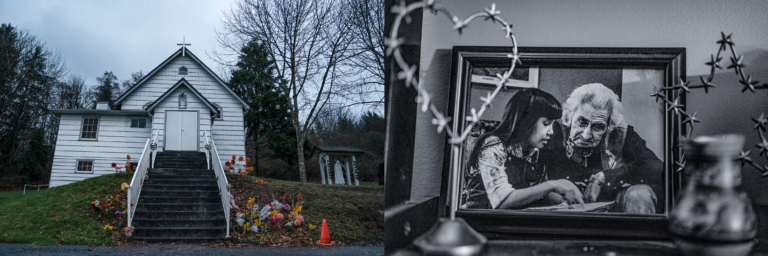
Left: At a now-derelict church on Tsleil-Waututh land, community members placed flowers, stuffed animals and other mementos to mourn the hundreds of Indigenous children who died at residential schools and whose unmarked graves were recently discovered across Canada.
Right: A young Charlene listens intently to her father and mentor, the late Chief Dan George.
It wasn’t until colonization and industry inundated the environment that we started to see things go extinct, Charlene says. “When the ecosystem is intact, it can bring medicine and healing and nutrition and all of that. And now our knowledge is starting to be sought after by organizations and governments without any acknowledgment of what truly happened, the violence and colonization of it all. There’s deep ancestral wisdom that is bursting out. And it’s not going to stop.” Now, she says, “it’s time they listen” as she motions her hand across the inlet where the refinery sits.
Although these are not my homelands, the story Charlene tells has echoed through every part of my life since I was a child. I have watched as the impacts of colonization and extractive capitalism ravaged the forests, mountains and waterways of the Salish Sea and coastal lands for the past 30 years. As an academic, decolonial educator and wilderness guide, all my worlds collided in 2020 when I was asked to compile Spirits of the Coast, an anthology of the Southern Resident orca whales.
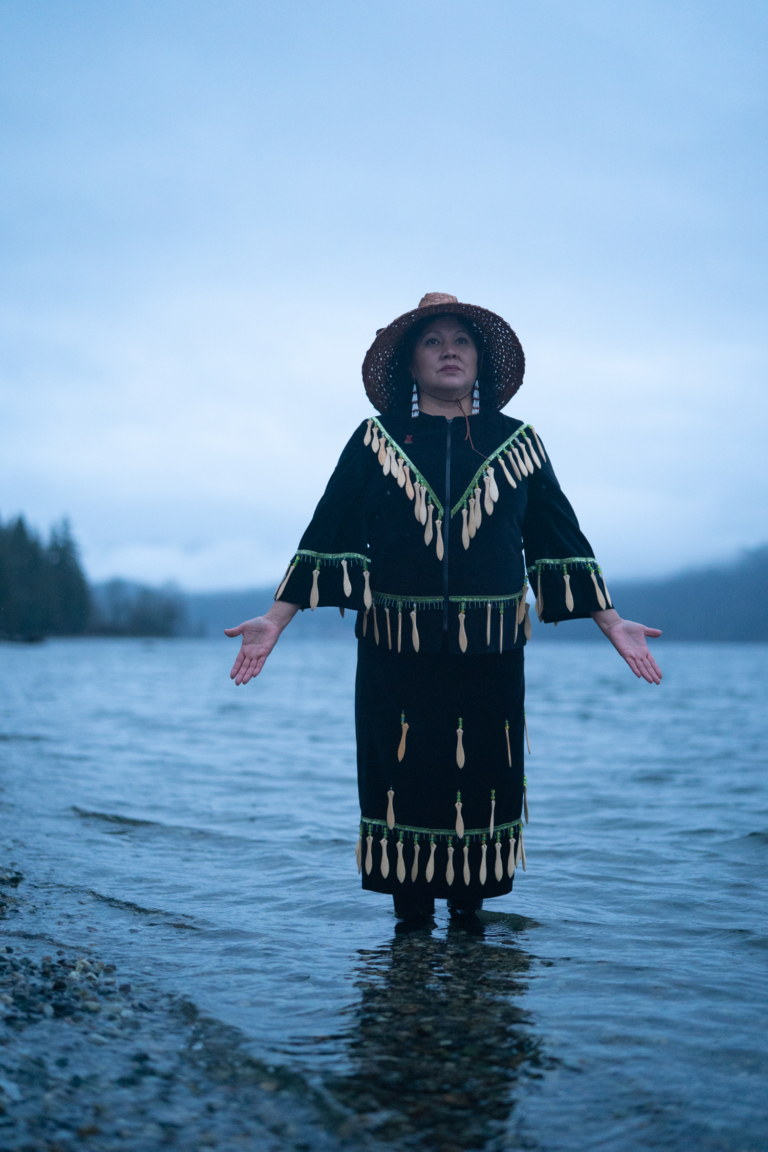
All life thrives when water is clean. Charlene brings us down to the shores of the inlet at dusk to honor the water that sustains her people.
When I began working on Spirits of the Coast, there were 80 surviving Southern Resident orcas; by the time I completed the manuscript, there were 73. Today there are 74. As I wrote in the introduction, I hoped the book would “not be a eulogy, but a celebration, a call to action … May the generations to come tell the story not of our failure, but of our triumph against many odds, to find a path towards our collective survival.”
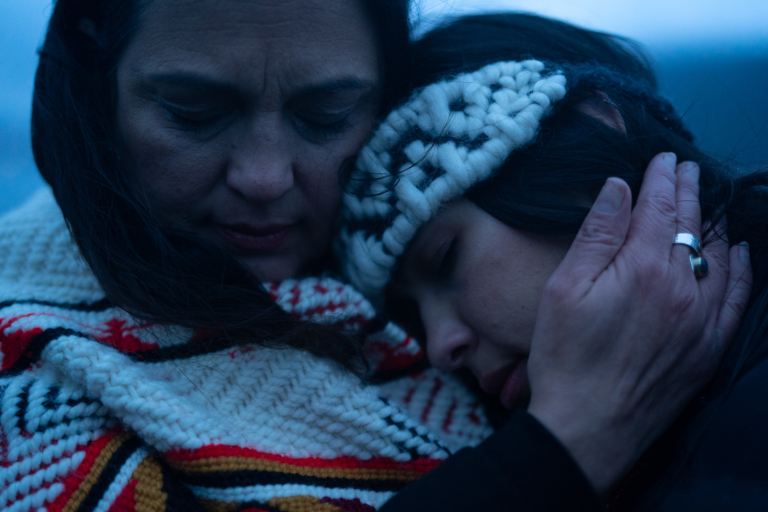
A moment of grace between mother and daughter. During their visit, photographer Danielle Khan Da Silva and the author came to understand that beyond protests and legal battles, love is at the root of the Tsleil-Waututh fight to protect the inlet.
I echo these sentiments now, and I can think of no more meaningful ode to the ache of what is at stake and the grief for what has already been lost than with the words of Jess Housty, one of the book’s contributors. As an orca clan matriarch, knowledge keeper, lineage bearer and Haíłzaqv mother, she wrote:
Like many others, I watched with an ache in my heart in 2018 when Tahlequah, an orca in the Southern Resident J-Pod, nudged her dead calf to the ocean’s surface for 17 days in what appeared to be a ritual of mourning.
Orcas and certain other cetaceans have been observed in this sort of vigil for their dead before, but the length of time and the physical distance that this mother carried her dead calf is new to our human frame of reference. It was widely reported as a “sad spectacle”—a phrase that implies a passivity in us, mere spectators. But I believe that grief was meant to be active—to be participatory.
Grief is ceremony. It can have elements that are both private and public, but when it is enacted in a public way as Tahlequah’s was, we can’t be simple spectators. We need to be witnesses.
In Haíłzaqv culture, to be a witness is a deep responsibility. It obligates you to be an archive embodied, ready to recall the events and the ceremonies you have witnessed and the business that has been conducted before you when the record of your testimony is required.
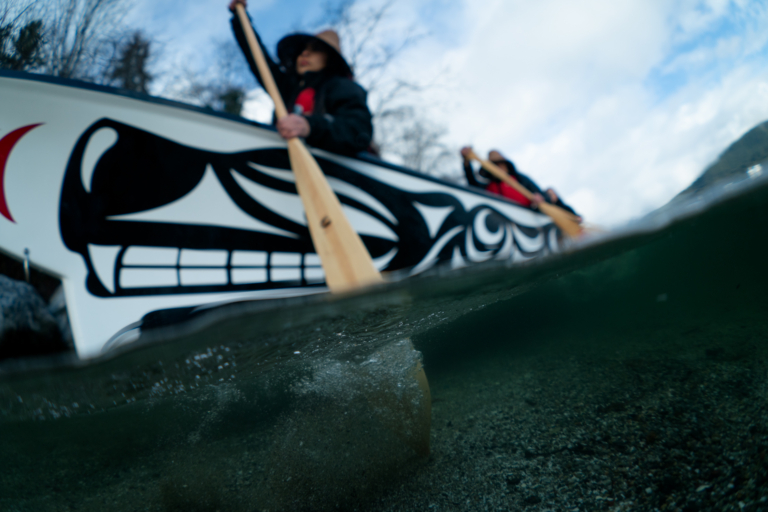
The embodiment of sacred rituals, Kayah takes her place at the bow. With each stroke, the next generation leads the way forward. The artwork along the gunnel depicts the head of a takaya (wolf), an animal central to Tsleil-Waututh sacred stories.
And so now, as you have read these words, contemplated the beauty of this place and its people, I invite you, too, to bear witness to what is taking place and what is at stake. To honor the Tsleil-Waututh matriarchs, both human and orca, by carrying forward these teachings of intergenerational legacy, historical memory and the importance of never forgetting how to find our way home.
Show your support of the Tsleil-Waututh matriarchs by following Tsleil-Waututh Nation Sacred Trust
